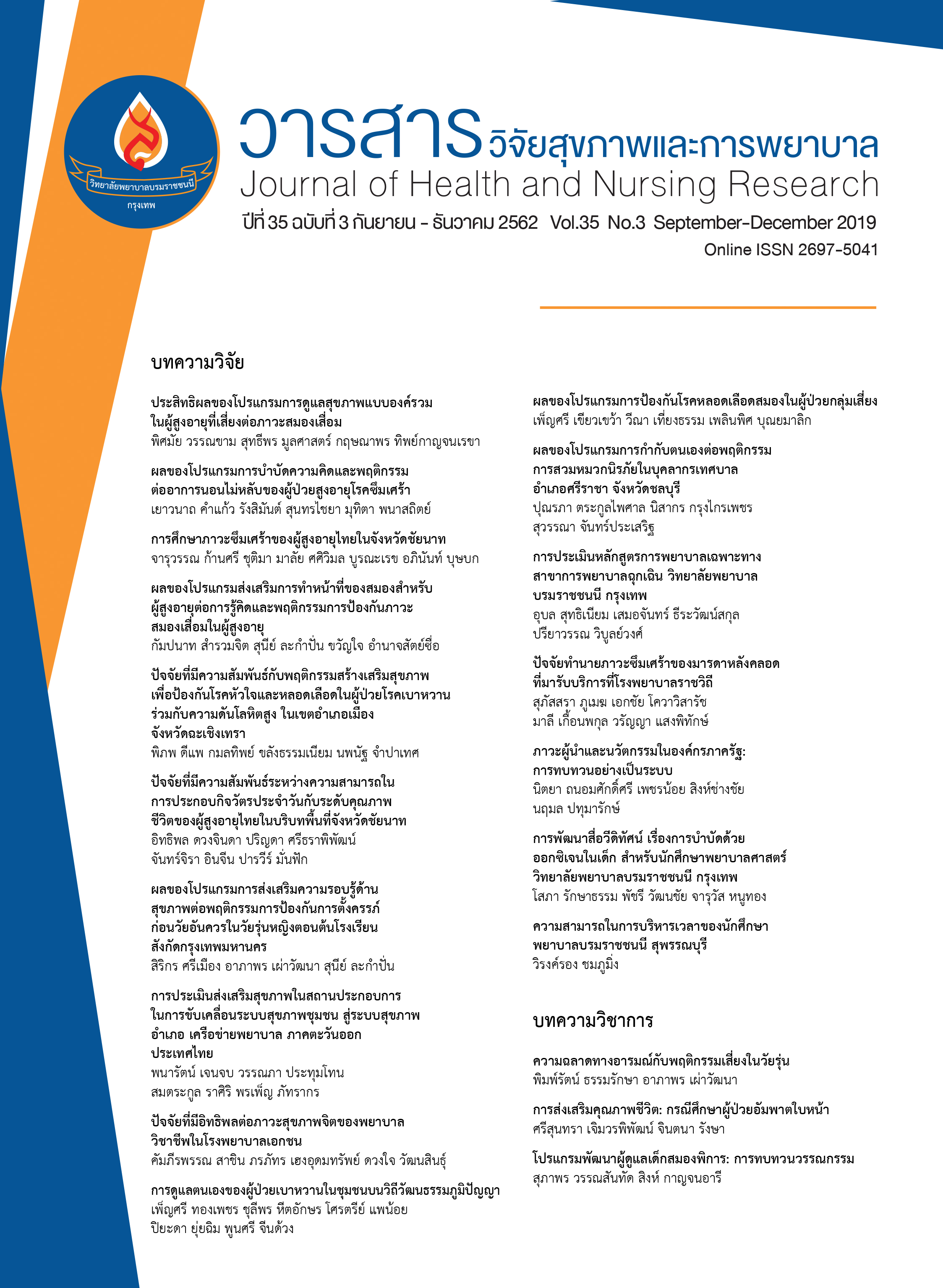ผลของโปรแกรมส่งเสริมการทำหน้าที่ของสมองสำหรับผู้สูงอายุ ต่อการรู้คิดและพฤติกรรมการป้องกันภาวะสมองเสื่อมในผู้สูงอายุ
คำสำคัญ:
โปรแกรมส่งเสริมการทำหน้าที่ของสมอง, พฤติกรรมป้องกันภาวะสมองเสื่อม, การรู้คิด, ผู้สูงอายุบทคัดย่อ
การวิจัยกึ่งทดลองแบบสองกลุ่ม วัดผลก่อนและหลังการทดลอง มีวัตถุประสงค์เพื่อศึกษาผลของโปรแกรมส่งเสริมการทำหน้าที่ของสมองสำหรับผู้สูงอายุ ต่อ การรู้คิด และพฤติกรรมการป้องกันภาวะสมองเสื่อมในผู้สูงอายุ กลุ่มตัวอย่าง คือ ผู้สูงอายุที่มีอายุระหว่าง 60 - 79 ปี ที่อาศัยอยู่ในเขตพื้นที่อำเภอเมือง จังหวัดชลบุรี จำนวน 56 คน แบ่งเป็นกลุ่มทดลองและกลุ่มเปรียบเทียบ กลุ่มละ 28 คน กลุ่มทดลองได้รับการเข้าร่วมโปรแกรมส่งเสริมการทำหน้าที่ของสมองสำหรับผู้สูงอายุจำนวน 5 กิจกรรม โดยมีการประยุกต์ใช้แนวคิดการรับรู้ความสามารถของตนเอง (Self-efficacy) และกลุ่มเปรียบเทียบได้รับกิจกรรมปกติของโรงเรียนผู้สูงอายุ โดยมีระยะเวลาในการศึกษา จำนวน 8 สัปดาห์ เก็บรวบรวมข้อมูลโดยการสัมภาษณ์ข้อคำถาม ในระยะก่อนการทดลอง และหลังการทดลอง วิเคราะห์ผลด้วยสถิติเชิงพรรณนา chi-square, paired t-test และ independent t-test
ผลการวิจัยพบว่า หลังการทดลอง กลุ่มทดลองมีคะแนนเฉลี่ยพฤติกรรมการป้องกันภาวะสมองเสื่อม และการรู้คิด มากกว่าก่อนการทดลอง อย่างมีนัยสำคัญทางสถิติ (p <.05) และผลต่างของคะแนนเฉลี่ยพฤติกรรมการป้องกันภาวะสมองเสื่อม และการรู้คิด มากกว่ากลุ่มเปรียบเทียบ อย่างมีนัยสำคัญทางสถิติ (p < .05)
สรุปโปรแกรมส่งเสริมการทำหน้าที่ของสมองสำหรับผู้สูงอายุ ส่งผลต่อพฤติกรรมป้องกันภาวะสมองเสื่อม และการรู้คิดของผู้สูงอายุ จากการวิจัยเสนอแนะว่า พยาบาลเวชปฏิบัติชุมชนสามารถนำโปรแกรมส่งเสริมการทำหน้าที่ของสมองสำหรับผู้สูงอายุไปใช้เพื่อส่งเสริมสุขภาพของผู้สูงอายุในชุมชน
Downloads
เอกสารอ้างอิง
2. Prasartkul P, editors. Situation of Thai elderly 2016. Bangkok: Printery; 2017. (in Thai).
3. Aekplakorn W, editors. Thai National Health Examination Survey, NHES V.Nonthaburi: Health Systems Research Institute; 2014. (in Thai).
4. The Task Force of Health Data and Information, Bureau of Policy and Strategy, Ministry of Public Health. Public Health Statistics A.D. 2015. Bangkok: Samcharoen Panich; 2016. (in Thai).
5. Department of Provincial Administration, Ministry of Interior. Population and Register Home statistics [Internet]. 2018 [cited 2018 June 2018]. Available form: http://stat.dopa.go.th/stat/statnew/upstat_age.php. (in Thai).
6. Department of Mental Health, Ministry of Public Health. The Report of Patients receives services in Department of Mental Health by disease [Internet]. 2018 [cited 2018 may 11]. Available form: http://www.dmh.go.th/report/datacenter/map/. (in Thai).
7. Alzheimer’s Disease International. Dementia in the Asia Pacific Region. London: Alzheimer’s Disease International; 2014.
8. Turongkaravee S, Chaikledkaew U, Teerawattananon Y, Chansirikanjana S. Cost-utility analysis of acetylcholinesterase inhibitors in the treatment of mild to moderate alzheimer’s disease. Nonthaburi: The Graphico Systems; 2011. (in Thai).
9. Chansirikanjana S. The situation of dementia. In: The summary of brainstorming for policies development to prevention treatment and care dementia patients. Nonthaburi: The Graphico Systems; 2012. (in Thai).
10. Rakkhumnuan S, Lueboonthavachai P. Behavioral and psychological symptoms of dementia (BPSD) and caregivers of Alzheimer’s dementia patients at Department of Psychiatry, KingChulalongkorn Memorial Hospital. Journal of the Psychiatric Association of Thailand 2012;57(3):335-46. (in Thai).
11. Trakulsithichock S. Prevention of dementia in older persons. Journal of Nursing and Health Care 2018;36(4):6-14. (in Thai).
12. Pany S, Siri S, Sujirarat D, Pitikultang S, Tantirangsee N. Prevalence and association between activities and cognitive impairment among the elderly. Journal of Public Health. 2016;46(1):95-107. (in Thai).
13. Kroger E, Verreault R, Carmichael PH, Lindsay J, Julien P, Dewailly E, et al. Omega-3 fatty acids and risk of dementia: the Canadian Study of Health and Aging. The American journal of clinical nutrition 2009;90(1):184-92.
14. Walker JG, Batterham PJ, Mackinnon AJ, Jorm AF, Hickie I, Fenech M, et al. Oral folic acid and vitamin B-12 supplementation to prevent cognitive decline in community-dwelling older adults with depressive symptoms-the Beyond Ageing Project: a randomized controlled trial. The American journal of clinical nutrition 2012;95(1):194-203.
15. Basambombo LL, Carmichael PH, Cote S, Laurin D. Use of Vitamin E and C Supplements for the Prevention of Cognitive Decline. The Annals of pharmacotherapy 2017;51(2):118-24.
16. Bandura A. Self-efficacy: toward a unifying theory of behavioral change. Psychological review 1977;84(2):191-215.
17. Chumklang T, Duangsong R. The effects of exercise promotion program by the applying of self-efficacy and social support for pain decreasing among elderly with osteoarthritis khees in Wangnamkheaw District, Nakornratchasama Province. KKU Research Journal (Graduate Studies) 2012;12(1):46-56. (in Thai).
18. Chattrawongwiwat T, Kong-in W, Thaniwattananon, P. Impacts of a memory-enhancing programme on perceived memory self-efficacy amongst elderly people. Thai Journal of Nursing Council2013;28(2):98-108. (in Thai).
19. Kim EH, Suh SR. Effects of a memory and visual-motor integration program for older adults based on self-efficacy theory. Journal of Korean Academy Nursing 2017;47(3):431-44.
20. Train The Brain Forum Committee. Thai Geriatric Depression Scale-TGDS. Siriraj Hospital Gazette 1994;46(1):1-9. (in Thai).
21. Thai Cognitive Test Development Committee 1999. Mini-Mental State Examination-Thai 2002. Nonthaburi: Institute of Geriatric Medical, Department of Medical Services, Ministry of Public Health, Thailand; 2002. (in Thai)
22. Cohen J. Statistical power analysis for the behavioral sciences . 2nd ed. New Jersey: Lawrence Erlbaum Associates; 1988.
23. Sharoni SKA, Abdul Rahman H, Minhat HS, Shariff-Ghazali S, Azman Ong MH. The effects of self-efficacy enhancing program on foot self-care behaviour of older adults with diabetes: A randomised controlled trial in elderly care facility, Peninsular Malaysia. PloS one. 2018;13(3):e0192417.
24. Krabuanrat C. Nine square and brain development. Bangkok: Grand Sport Group;2009. (in Thai).
25. Cheunsakulpong T, Aebthaisong O. The effect of moving the body in the nine squares table with balance and memory in geriatric psychiatric patients who admitted in Prakaisuk ward. Journal of Srithanya Hospital 2012;13(13):16-26. (in Thai).
26. Saiyudthong S. Basic nuerophysiology. Bangkok: Chulalongkorn University Press; 2015. (in Thai).
27. Muangpisan W, editors. Dementia Prevention Assessment and Care. Bangkok: Parbpim Printing; 2013. (in Thai).
28. Kwok T, Wong A, Chan G, Shiu YY, Lam KC, Young D, et al. Effectiveness of cognitive training for Chinese elderly in Hong Kong. Clinical Interventions in Aging 2013;8:213-9.
29. Amarya S, Singh K, Sabharwal M. Changes during aging and their association with malnutrition. Journal of Clinical Gerontology and Geriatrics 2015;6(3):78-84.
30. Beilharz JE, Maniam J, Morris MJ. Diet-induced cognitive deficits: the role of fat and sugar, potential mechanisms and nutritional interventions. Nutrients 2015;7(8):6719-38.
ดาวน์โหลด
เผยแพร่แล้ว
รูปแบบการอ้างอิง
ฉบับ
ประเภทบทความ
สัญญาอนุญาต
บทความที่ได้รับการตีพิมพ์ เป็นลิขสิทธิ์ของวารสารวิจัยสุขภาพและการพยาบาล (วิทยาลัยพยาบาลบรมราชชนนี กรุงเทพ) ไม่สามารถนำไปตีพิมพ์ซ้ำในวารสารฉบับอื่น


















